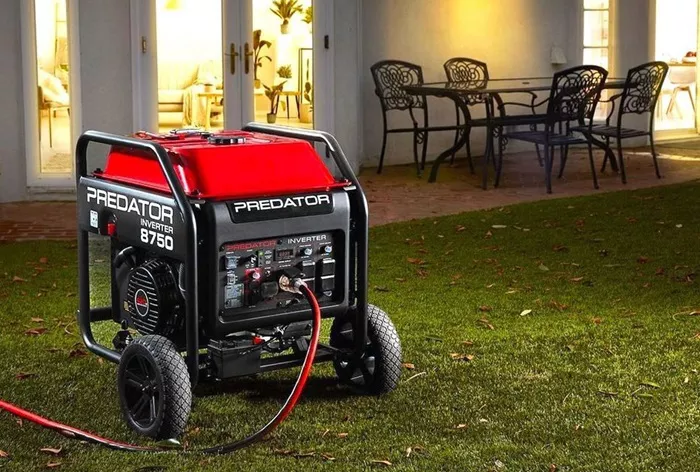Home generators are essential for providing backup power during outages, ensuring your household runs smoothly even when the grid fails. But with so many brands and models available, choosing the best one can be challenging. This guide will explore the top home generator manufacturers, key features to look for, and expert tips to help you make an informed decision.
What to Look for in a Home Generator
Before diving into the best brands, it’s important to understand the critical factors that determine a generator’s performance and reliability.
Power Output (Wattage)
Generators are rated by their wattage, which indicates how much power they can supply.
- Small (3,000–5,000 watts) – Powers essentials like lights, fridge, and a few outlets.
- Medium (7,000–10,000 watts) – Runs larger appliances, including AC units and water heaters.
- Large (12,000+ watts) – Whole-house coverage for extended outages.
Fuel Type
Different generators run on different fuels, each with pros and cons:
- Gasoline – Affordable but has a short shelf life.
- Propane – Cleaner burning and stores longer than gasoline.
- Diesel – Highly efficient and durable but noisier.
- Natural Gas – Connects directly to home gas lines for unlimited runtime.
Transfer Switch
A transfer switch automatically switches your home’s power from the grid to the generator when an outage occurs. There are two types:
- Automatic Transfer Switch (ATS) – Best for standby generators.
- Manual Transfer Switch – Requires user intervention, common in portable models.
Noise Level
Generators can be loud, especially diesel models. Look for:
- Decibel (dB) Rating – Under 60 dB is ideal for residential areas.
- Inverter Technology – Reduces noise and improves fuel efficiency.
Durability & Warranty
A good generator should last 10+ years with proper maintenance. Check:
- Engine Type – Commercial-grade engines last longer.
- Warranty Coverage – Top brands offer 3–5 years of protection.
Top Home Generator Brands
Now that we know what to look for, let’s examine the best home generator manufacturers.
Generac – The Industry Leader
Generac dominates the home generator market with reliable standby models.
Key Features:
- Power Range: 7,500–24,000 watts
- Fuel Options: Natural gas, propane, diesel
- Smart Technology: Mobile app monitoring
- Warranty: Up to 5 years
Best For: Whole-house backup power.
Kohler – Premium Performance
Kohler generators are known for their quiet operation and commercial-grade engines.
Key Features:
- Power Range: 8,000–150,000 watts
- Advanced Load Management: Prevents overloads
- Noise Level: As low as 58 dB
- Warranty: Up to 5 years
Best For: High-end homes needing ultra-reliable power.
Champion – Affordable & Reliable
Champion offers budget-friendly options without sacrificing quality.
Key Features:
- Power Range: 2,000–12,500 watts
- Dual-Fuel Capability: Runs on gas or propane
- Portable Options: Easy to move and store
- Warranty: 3 years
Best For: Budget-conscious buyers needing portable backup power.
Briggs & Stratton – Trusted Engine Quality
Briggs & Stratton is famous for durable engines in both portable and standby models.
Key Features:
- Power Range: 7,500–20,000 watts
- Steel Enclosures: Weather-resistant protection
- Smart Monitoring: Remote diagnostics
- Warranty: Up to 5 years
Best For: Long-lasting performance in harsh conditions.
Westinghouse – High-Value Inverter Generators
Westinghouse specializes in quiet, fuel-efficient inverter generators.
Key Features:
- Power Range: 2,200–12,500 watts
- Clean Power Output: Safe for sensitive electronics
- Extended Runtime: Up to 14 hours on a single tank
- Warranty: 3 years
Best For: RV owners and those needing portable, quiet power.
Portable vs. Standby Generators
Understanding the difference between these two types will help you choose the right one.
Portable Generators
Pros: Lower cost, easy to move, no installation needed.
Cons: Manual operation, limited power, requires fuel storage.
Best Use: Emergency backup for small homes or job sites.
Standby Generators
Pros: Automatic operation, higher power output, connects to home gas lines.
Cons: Expensive, requires professional installation.
Best Use: Whole-house backup for frequent outages.
Maintenance Tips for Longevity
A well-maintained generator lasts longer and performs better.
- Regular Oil Changes – Every 50–100 hours of use.
- Battery Checks – Ensure the battery is charged (for standby models).
- Fuel Stabilizer – Prevents fuel degradation in portable units.
- Exercise the Generator – Run it monthly to keep parts lubricated.
- Professional Inspections – Annual check-ups prevent major issues.
Final Verdict: Who Makes the Best Home Generator?
- Best Overall: Generac (Reliable, wide power range, smart features)
- Best Premium Option: Kohler (Quiet, commercial-grade, long warranty)
- Best Budget Pick: Champion (Affordable, dual-fuel, portable)
- Best for Durability: Briggs & Stratton (Strong engines, weatherproof)
- Best Inverter Generator: Westinghouse (Quiet, efficient, safe for electronics)
Conclusion
Choosing the best home generator depends on your power needs, budget, and fuel preferences. Generac and Kohler lead in standby models, while Champion and Westinghouse offer excellent portable options. Regular maintenance ensures your generator remains reliable for years. By understanding these key factors, you can confidently select the best generator to keep your home powered during any outage.

